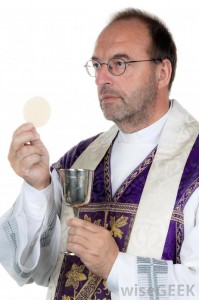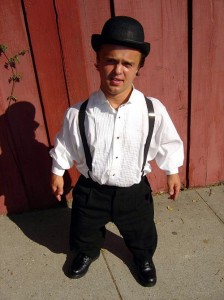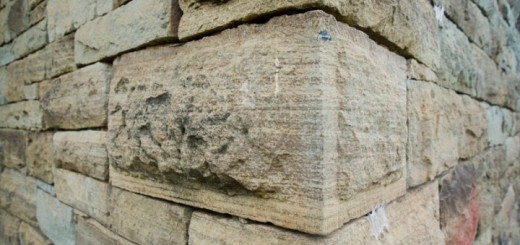The next part of the story….
 Priests had to be different. Even more different than the people of Israel. They had a special role to play as mediators between God and the people. They had to keep themselves extra clean and free from sin. There were physical restrictions about cutting beards and hair. It does not say they could not marry at all (in fact, it goes on to say ‘if a priest’s daughter….’ so presumably they did), but they could not marry a divorced woman or a former prostitute.
Priests had to be different. Even more different than the people of Israel. They had a special role to play as mediators between God and the people. They had to keep themselves extra clean and free from sin. There were physical restrictions about cutting beards and hair. It does not say they could not marry at all (in fact, it goes on to say ‘if a priest’s daughter….’ so presumably they did), but they could not marry a divorced woman or a former prostitute.
And the High Priest had to be extra different. Even more different than the priests.
And why all this?
because priests are holy to their God. Regard them as holy, because they offer up the food of your God. Consider them holy, because I the Lord am holy – I who make you holy. Leviticus 21:7-8
Most church traditions still have leaders – some are called priests, others vicars, ministers, pastors…..all have a special role to play and a special responsibility towards God’s people. Much is expected of them. They are to be role models. They are spiritual mentors and leaders. They are human of course, but they are to seek to be holy.
(Just like the rest of us, of course. Since Jesus, everything has changed and we are now all part of a holy priesthood –
As you come to him, the living Stone – rejected by humans but chosen by God and precious to him – you also, like living stones, are being built into a spiritual house to be a holy priesthood, offering spiritual sacrifices acceptable to God through Jesus Christ. 1 Peter 2;4-5)
 The next section is tricky. It seems to be the ultimate in discrimination and doesn’t sit well with my view of God, who loves everyone equally, regardless of defect or disability –
The next section is tricky. It seems to be the ultimate in discrimination and doesn’t sit well with my view of God, who loves everyone equally, regardless of defect or disability –
For the generations to come none of your descendants who has a defect may come near to offer the food of his God. No man who has any defect may come near: no man who is blind or lame, disfigured or deformed; no man with a crippled foot or hand, or who is a hunchback or a dwarf, or who has any eye defect, or who has festering or running sores or damaged testicles. Leviticus 21:16-20
It’s not even that all of these are obvious to the naked eye – take damaged testicles, for example.
God was emphasising and underlining the importance of perfection when approaching him. Spiritual perfection was signified by physical perfection. This is discrimination and it is right that we should be uncomfortable with this. This is definitely not a justification for discrimination though. Everything has changed with regards to approaching God. As we come to God, we are ALL a holy priesthood.
Anyone who is unclean cannot eat the sacred offerings without defiling the whole. The priests are to ensure this – or else –
The priests are to perform my service in such a way that they do not become guilty and die for treating it with contempt. I am the Lord, who makes them holy. Leviticus 22:9
In the same way as those who bring the offerings have to be without defect, so do the offerings themselves. The people have to bring of their best to God. And then there is a list of the appointed feasts – the Sabbath, the Passover, the Feast of Unleavened Bread, the Firstfruits Offering, the Feast of Weeks, the Feast of Trumpets, the Day of Atonement and the Feast of Tabernacles – lasting ordinances for generations to come.
The lamps of the tabernacle are to be tended continually so that they never go out. Bread is to be prepared and offered regularly, Sabbath after Sabbath, eaten by Aaron and his sons in the holy place – sound familiar at all?
And then abruptly, we step outside this teaching and all these regulations for an actual living example. These were not just words. All of this teaching from God was actually applied to real lives. The son of Shelomith and Dibri (a real lad with a real mum and dad) blasphemed the Name (of God) with a curse. He was taken outside the camp and stoned to death, just as the Lord commanded Moses. God reminds the people that if anyone kills another person, he is also to be put to death and for all other injuries, exact restitution (not escalating retaliation) must be made –
The one who has inflicted the injury must suffer the same injury. Leviticus 24:20
 You may be wondering why I am doing this. Why I am wading through all this Old Testament teaching which has little relevance to our lives today (except as we have discovered, it does have quite a bit…). I am loving it. This is what I get up for in the mornings. When I started out in Genesis, a few of my ‘critics’ (who keep it real in my life) were saying ‘Well, just wait til you get to Leviticus, then you might start to regret all this’. Well, I haven’t. Not at all.
You may be wondering why I am doing this. Why I am wading through all this Old Testament teaching which has little relevance to our lives today (except as we have discovered, it does have quite a bit…). I am loving it. This is what I get up for in the mornings. When I started out in Genesis, a few of my ‘critics’ (who keep it real in my life) were saying ‘Well, just wait til you get to Leviticus, then you might start to regret all this’. Well, I haven’t. Not at all.
It’s a bit like when you fall in love and you want to know everything, simply everything, about this exciting new individual. You want to see every photo of them as a child and never bore of hearing their grandma telling the same anecdote over and over again. You have so many questions and want to see every house they ever lived in and every friend they made along the way.
That’s kind of how I am feeling right now. I feel like I am getting to know some of the background of the God that I love and serve. This reading of the more obscure parts of the Bible excites me as it fills in the gaps and fleshes out the back story.
Writing this blog is not a chore. It takes me far away from the realities of every day life and then draws me back in with relevant insights that still work for me and challenge me today.
We are actually nearly at the end of Leviticus – only three of four more posts to go – and I know, there are more than three or four days of the month left. But I intend to take the last week of the month off. We’ve seen how God highlights the value of regular breaks and I need a break. Not least of all because it is my 50th birthday in the last week of the month and I intend to have a week of rest and relaxation and celebration!
So today’s post may not have been the most inspiring, but it is the next part of the story and therefore matters.












